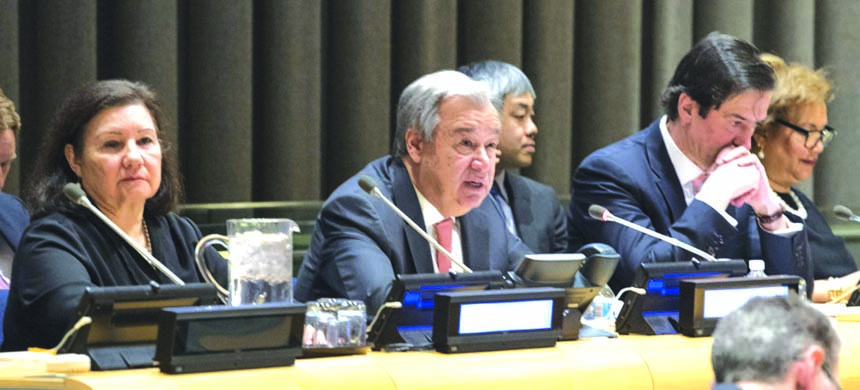
Reuters, Yangon :
The head of the United Nations in Myanmar on Wednesday expressed concern about the situation in the western state of Rakhine, where fighting between the military and the rebel Arakan Army has displaced about 4,500 people since early December.
Myanmar government leader Aung San Suu Kyi on Monday discussed insurgent attacks on police in a rare meeting with the military chief, and her administration called for the armed forces to “crush” the rebels.
Knut Ostby, who acts as the resident coordinator for the United Nations, said in a statement he was “deeply concerned about the situation” and urged “all sides to ensure the protection of all civilians” and to respect human rights.
“Mr Ostby further appeals to all sides to intensify efforts to find a peaceful solution to the situation and to ensure humanitarian access to all people affected by the violence,” the United Nations said in a statement.
The Arakan Army wants greater autonomy for Rakhine State, where the mostly Buddhist ethnic Rakhine people make up the majority of the population.
Rakhine State saw a military-led crackdown in 2017, following attacks by Rohingya Muslim insurgents that prompted hundreds of thousands of Rohingya to flee westwards into neighboring Bangladesh.
At a meeting on Monday between government and military leaders, the office of President Win Myint said it had instructed the military to “crush the terrorists”, the government spokesman later told a news conference.
While Suu Kyi is barred from being president by a military-drafted constitution, the president is a loyalist. Suu Kyi is seen as de facto leader of the civilian government, while the military remains in charge of security.
Arakan Army insurgents killed 13 policemen and wounded nine in attacks on four police posts on Friday, as Myanmar celebrated Independence Day, state media reported.
An Arakan Army spokesman outside Myanmar told Reuters last week the group attacked the security forces in response to a broad military offensive in the north of Rakhine State that also targeted civilians.
The U.N. Office for the Coordination of Humanitarian Affairs said on Monday that 4,500 people were sheltering in monasteries and communal areas after being displaced by the fighting in the past month.
Myanmar governments have battled various autonomy-seeking ethnic minority insurgent groups since shortly after independence from Britain in 1948, though some have struck ceasefire agreements.
Rakhine State saw a military-led crackdown in 2017, following attacks by Rohingya Muslim insurgents that prompted hundreds of thousands of Rohingya to flee westwards into neighbouring Bangladesh.
At a meeting on Monday between government and military leaders, the office of President Win Myint said it had instructed the military to “crush the terrorists”, the government spokesman later told a news conference.
While Suu Kyi is barred from being president by a military-drafted constitution, the president is a loyalist. Suu Kyi is seen as de facto leader of the civilian government, while the military remains in charge of security.
Arakan Army insurgents killed 13 policemen and wounded nine in attacks on four police posts on Friday, as Myanmar celebrated Independence Day, state media reported.
An Arakan Army spokesman outside Myanmar told Reuters last week the group attacked the security forces in response to a broad military offensive in the north of Rakhine State that also targeted civilians.
The UN Office for the Coordination of Humanitarian Affairs said on Monday that 4,500 people were sheltering in monasteries and communal areas after being displaced by the fighting in the past month.
Myanmar governments have battled various autonomy-seeking ethnic minority insurgent groups since shortly after independence from Britain in 1948, though some have struck ceasefire agreements.

